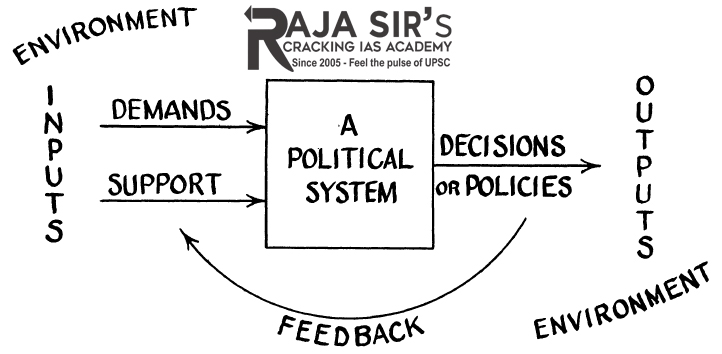- Home
- Prelims
- Mains
- Current Affairs
- Study Materials
- Test Series
Discuss David Easton’s model of system analysis. (UPSC CSE Mains 2015- Political Science and International Relations, Paper 1)
David Easton was the first political scientist who systematically developed a framework on the basis of the systems approach for the study of politics systems. He put forward his ideas in his work entitled “The Political System: An Inquiry into the State of Political Science”, published in 1953. Later on it was elaborated in his books namely “A Framework for Political Analysis” and “A Systems Analysis of Political Life”, both published in 1965.
Political System
- The political system according to Easton “as that system of interactions in any society through which binding or authoritative allocations are made and implemented”. This definition highlights that political system is one among the social system. It allocates by means of policies. Its allocations are also authoritative. Further its authoritative allocations are binding on the society as a whole.
- The political system is one among other forms of social systems. It means that political systems functions within a certain boundary. But it is very difficult to determine its exact boundary. The boundary of a political system is defined by all those actions more or less directly, related to the making of decision for a society which are binding.
- The political system lives in an environment. The environment may be intra-societal and extra societal environment. The intra-societal forces of an environment have their place within the political system itself. But the extra societal forces operate outside it. Both of them had their impact on the decision-making process.
- A political system always remains subject to challenge from its environments. Easton regards all political systems as open systems. As a political system lives in , environment, it is open to influence from environment. Easton also treats the political system as adaptive. His primary emphasis is on the nature of exchange and transaction that take place between a political system and its environment.
 Systematic Persistence
Systematic Persistence
- In the opinion of Easton, the political system is always subject to stresses. Stresses means challenges which disturb the working of the political system. Whatever may be the political system, it continues to persist.
- The political system receives. challenges as well as supports from the society and react to the challenges of demands to maintain itself with the help of support it receives. The demands and supports received by the political system from the society make the inputs which take the form of outputs through a conversion process. This is followed by the feedback mechanism.
In order to regulate the stresses from the environment the political system has got the following regulatory mechanisms:
- The political system developed a number of communication channels through which demands may be persuaded, or pressurized to get considerably diluted.
- It also had a number of reduction processes by which demands may be forced to convert themselves into specific issues without which it may be pointed out, they would not be able to feed the conversion process of the political system in a proper way.
- There are certain cultural mechanisms and social-cultural norms which establish influential criteria of appropriation for the articulation of political demands.
Easton introduced the concept of support in addition to the regulatory mechanism of the political system for its persistence and survival.
Easton’s Policy-making Process or Easton’s Models
- For the study of political system, David Easton has presented a model of the political system. This model of Easton or policy making process of Easton’ is regarded as a “blackbox” which converts the demands of the society into policies. The demands may be the demand of wage and working hour laws, educational opportunities, recreational facilities, roads and transports etc. And support is the energy in the form of actions or organization promoting and resisting a political system. Supports are included Material support such as the payment of taxes or other levies, obedience to law and regulation etc.
- The demands and supports that the political system receives from the environment in the form of inputs go through a conversion process within the system and take the form of outputs. A feedback mechanism is developed through which the efforts and consequences of output are put back into the system and inputs.
- To Easton a political system is a complex cyclical operation where a set of processes, which convent inputs into outputs as a routine matter. To Easton authorities formulate public policies in a political system. Policy-making is closely related to decision-making. But every decision does not constitute a policy. Decision-making involves the identification of problem, a careful analysis of possible alternatives and the selection of one alternative for action. The policy decisions provide a sense of direction to the courses of administrative action.









 Latest News
Latest News
 General Studies
General Studies